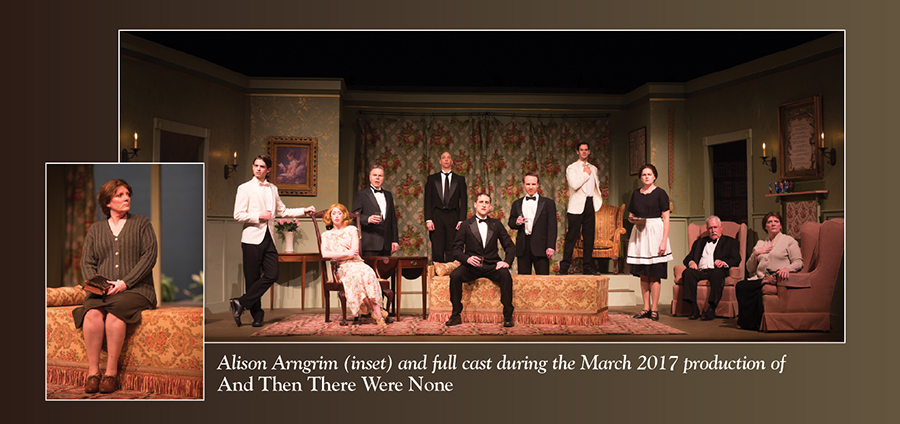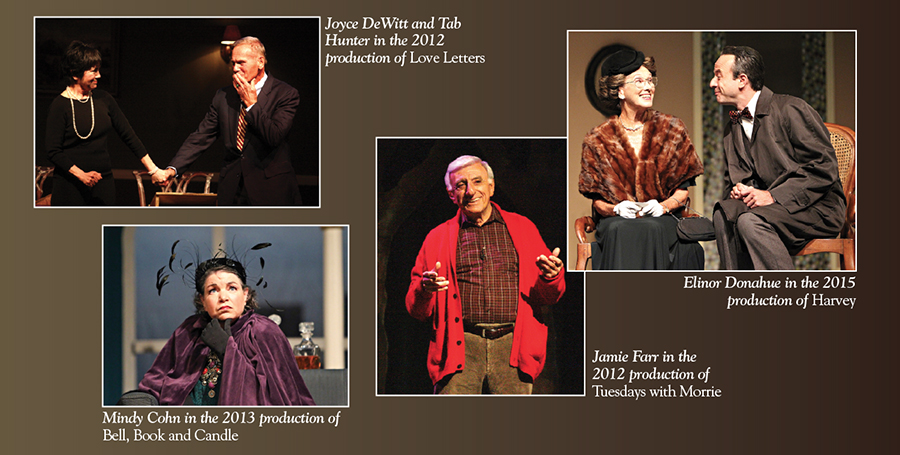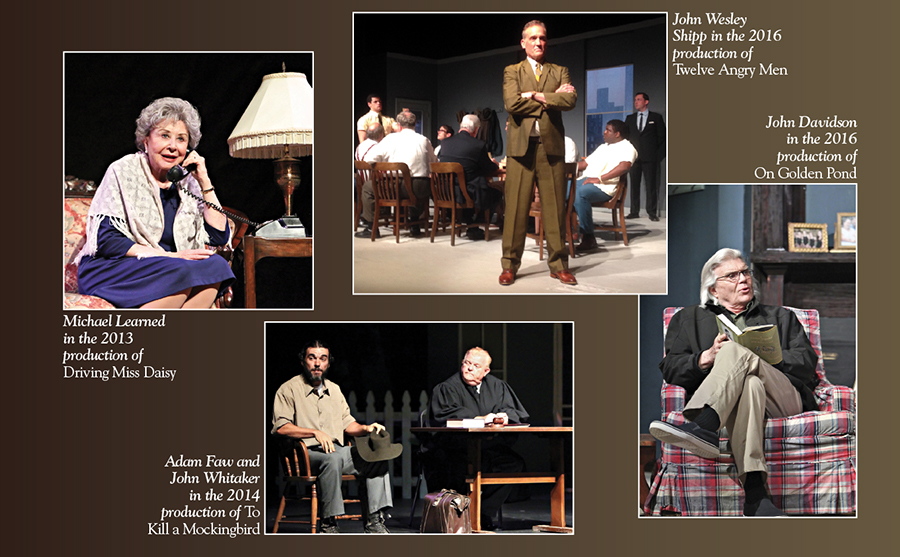
Enter, Stage Left
Morgan Sills brings a bit of Broadway to town
By Jim Moriarty
Morgan Sills and his father, Milton, back their 15-year-old blue Dodge Dakota truck up to the Judson Theatre Company storage unit and fill the bed with the driftwood of a stage production — the pine board flats, the weights, the stage braces — that transform a New England cottage in On Golden Pond into a jury room for Twelve Angry Men or a mysterious mansion off England’s Devonshire coast in And Then There Were None. Hauling sets around Manhattan is not part of the job description when Sills produces a play in New York, where he lives. You might say this is off, off, off Broadway and the curtain goes up twice a year. The next time will be Oct. 19-22 when the flats are reassembled in Owens Auditorium at Sandhills Community College as an aging actor’s apartment in The Sunshine Boys. One of the leads will be played by Robert Wuhl, known, among other things, for his HBO show Arliss and for delivering the Gettysburg Address of pitching mound speeches in Bull Durham when he ad-libbed some candlesticks. The other Sunshine Boy will be played by Don Most who was Ralph Malph on Happy Days and, more recently, Rusty Pillsbury (Emma’s dad) on Glee.
When Sills and his business partner, Daniel Haley, decided to start a theater company, they searched locations across the country before settling on Sills’ hometown for their excellent adventure. “He and I both toured all over, so we’d seen a lot of places,” says Haley. “We laid out a list of criteria that the place needed to meet and Pinehurst fit. It was a bonus that Morgan was from there, so we had some community ties to begin with.”
Coming up with a name was a bit trickier. You might say they got it out of a phone book. “It’s one of the most spirited discussions that Daniel and I have ever had,” says Sills. “We tossed around all kinds of things. We looked at paint samples for colorful words. We went down cardinal, dogwood, scuppernong, all the North Carolina things. Then I found a list of the old telephone exchanges in Manhattan. At the time Daniel was living on 52nd Street and I was living in my apartment on 48th Street and we were both in the Judson exchange.” Simple as dialing “M” for murder.
What isn’t quite so simple is bringing New York-level acting and producing to the Sandhills on a biannual basis. Sills studied at New York’s Commercial Theater Institute and his productions include Of Mice and Men starring James Franco and Chris O’Dowd on Broadway; the New York off-Broadway production of Shear Madness, a show that has surpassed 600 performances; and Tennessee Williams’ The Two-Character Play with Amanda Plummer and Brad Dourif. Haley has directed multiple off-Broadway plays at York Theatre Co. and recently spent a good portion of his summer at the Texas Shakespeare Festival, choreographing Much Ado About Nothing and directing and choreographing The Marvelous Wonderettes. He has directed all but one of Judson’s productions. Both Sills and Haley began their careers as performers. “Between the two of us there really wasn’t a job in the theater that we hadn’t done at a professional level,” says Sills.
Theater is art but it’s business, too. “We were very careful. We managed to get started and operate to this day for a very low cost, from very careful producing,” says Sills. “We try to put the dollars on the stage.” It’s the calling card of Judson Theatre Company. Getting established actors from New York or California to agree to spend 2 1/2 weeks in the comparative wilderness of North Carolina is neither cheap nor easy, but Sills has managed it for six seasons.

There’s a template. Alison Arngrim, best known for her character Nellie Oleson in Little House On The Prairie and her one-woman show Confessions of a Prairie Bitch, played her part in it during the March production of And Then There Were None. “They’ve got a formula. They know what plays well in their market. They’ve done surveys and focus groups,” she says. “Then they bring in a celebrity that they all know, not randomly selected celebrities, but someone you might have seen in another production so you know they have acting chops.” Then Sills and Haley surround them with other actors they’ve auditioned, mostly from New York. The result is a good experience for the actors on the stage and the people in the seats.
“I cannot say enough nice things about Morgan and the whole production. I really loved being there,” says Arngrim. “I started selling Morgan on my friends, that’s how much I liked it. I’ve been telling everyone like, if you’re considering doing it, get your ass down there. It was just amazing. It was a massive amount of rehearsal. They weren’t fooling around. They work you like a dog. They make sure it’s done right.”
Part of the work is a deep dive into the community. By the second season, Judson began using high school students for stage crew. That morphed into internships and integration with high school English classes, supported by modest fundraising initiatives. “We dipped a toe in the water previously, but we really took a big step with Twelve Angry Men,” says Sills. “We did a school show in the morning for between 600 and 650 10th-graders who were studying civics at all three public high schools from all ethnic and economic demographics. We raised enough funds to buy the book. There’s a beautiful Penguin edition with an introduction by David Mamet. So, they attended the show for free, they had the book that they read ahead of time and the script for classroom study. We had a professional study guide written. After the show there was a curated question and answer so they could talk with the actors. After that John Wesley Shipp, dear John, just sort of jumped off stage and walked into the audience, took pictures and all that because they watch The Flash. He’s a superhero. That’s something that hasn’t happened in Moore County.”
The outreach carried over to And Then There Were None. “We did an extra show for students,” says Arngrim. “They were given a copy of Agatha Christie’s book and they had a whole study plan. Then they came and saw the show and they had a Q&A and I thought, what a thing to do. During the course of the show Morgan and Daniel had people going out and speaking at the local schools. I’m thinking, why isn’t everyone doing this?”

The school involvement will be somewhat different with The Sunshine Boys. “I want to be really honest about the educational connection,” says Sills. “We don’t want to try to connect it spuriously. We are a professional theater in service to the community. So, John Davidson (On Golden Pond) might show up with his guitar at the Rotary meeting. But it’s more than just ‘come to the show.’ For The Sunshine Boys I think the educational performance is probably going to be just the theater kids. In the spring of 2018 it’s going to be The Miracle Worker, and that will be a big thing for the students. As the arts face all these challenges in the schools we’re part of the solution.”
It’s in Sills’ blood. His mother, Elaine, and father, Milton, each worked in the public school system for 37 years. She taught music for 36 of them; he taught for 10 years and spent 27 in administration. If the education gene is powerful, so is the showbiz one. Milton Sills saw The Teahouse of the August Moon at the Pinehurst Theater building when it was still a theater. “It was a great place. You had sort of a semicircle stage setting and a balcony upstairs. It was a very fine theater for the time,” Milton says. On one trip to New York he saw Louis Armstrong and Pearl Bailey in Hello, Dolly! “One of the things that happened in the show that was fascinating was Pearl was dancing and her corset came undone and she just backed up to the curtain and this hand reached out and pinned her up and she never missed a kick.” When Sills got old enough to join his parents on New York excursions, they saw shows like Cats, The Full Monty and A Streetcar Named Desire. On one trip he and his father took in nine Broadway shows in eight days. Sills graduated from Pinecrest High School in 1990, double-majored in English and Theater at Wake Forest University and then headed off to find the footlights.
“I moved in with somebody that I had done summer stock with. Three of us in a one-bedroom apartment. There were two twin beds in the actual bedroom and I stayed on the pullout sofa for a year and a half. My rent was $200 a month, but I was in New York,” says Sills. “You become an adult and you start to realize that your life is following a non-traditional path and you make your peace with that. When my father realized that I’m 6-foot-2 and he didn’t have a basketball player on his hands, he came down to what was then Sandhills Little Theater and would be in shows with me. We were in Inherit the Wind and The Skin of Our Teeth.”

Wuhl and The Sunshine Boys fit the Judson Theatre Company template perfectly. Wuhl’s acclaimed HBO documentary on the facts and myths of American history, Assume the Position with Mr. Wuhl, and Most’s recurring appearances on Glee will make them a hit with the high school crowd, while Neil Simon will work his magic on the older folks. “This is our second Neil Simon play. If you look at anything I’ve ever touched, it’s just valid on the page. The old saying ‘If it ain’t on the page, it ain’t on the stage’ is really true,” says Sills. “It fits because we do beloved classic plays but it’s also important that the audience knows they’re going to have a good time. Laughter is so important. The Sunshine Boys is about the friendships that define our lives, about how we choose to age. It’s about changes in show business, about whatever business you’re in, how important it is to stay with the times. It’s like a buddy movie. As divided as the world may look, all kinds of people can come to The Sunshine Boys and enjoy it together. All kinds of people in terms of who they are and what they believe, they come to the show and they laugh and we’re all friends and that’s important.”
After each show, the cast has the unusual custom of coming to the lobby to mingle with the audience. It has become part of the gig. The only drama in the Judson Theatre Company is on the stage, never behind it. These are working pros. During rehearsal Sills times the show while he edits the program. Haley takes notes on blocking, or maybe the delivery of a line, on a folded 8-by 10-sheet of paper. Someone drops a line and curses at the stumble. The stage manager yells “blackout” and “lights up” as the scenes change. They’re a troupe going about their craft.
For Sills, forming Judson Theatre Company did more than just give back to the community where he grew up; it’s an investment in the one he’ll return to. “I’m going to retire here,” he says, “and I want to make sure there’s a theater when I do.”
Jim Moriarty is senior editor of PineStraw and can be reached at jjmpinestraw@gmail.com.





